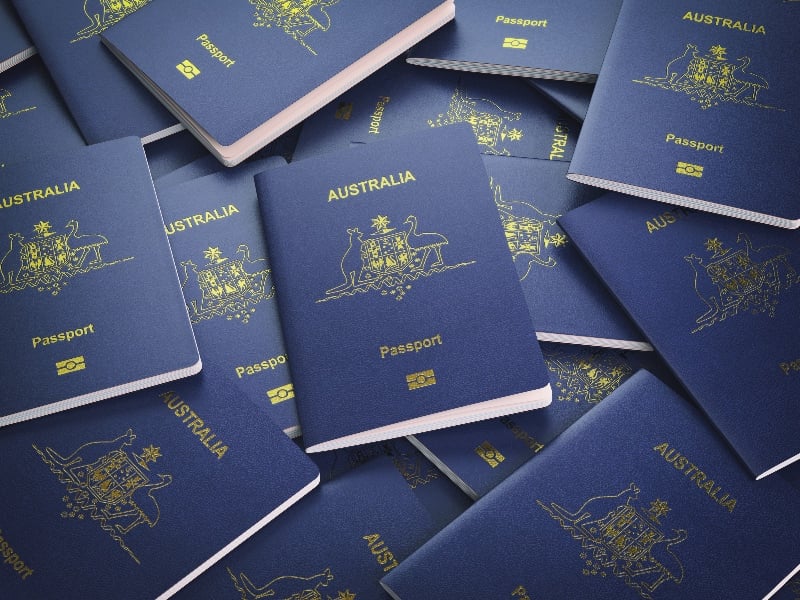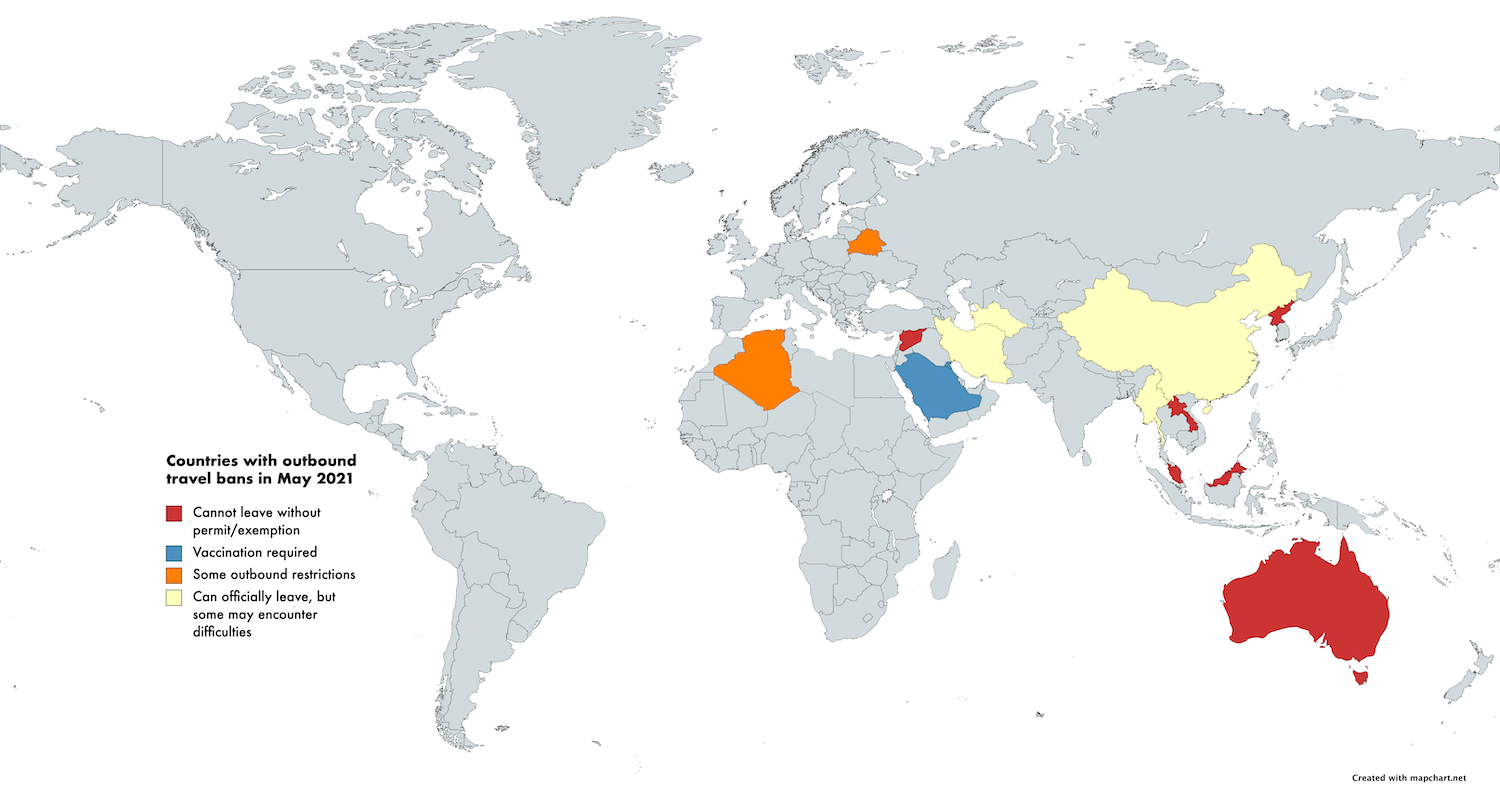Which Countries Ban Their Citizens From Leaving?

On 25 March 2020, the Australian government banned its citizens and permanent residents from leaving the country without a travel exemption as an emergency coronavirus measure. Fourteen months later, the temporary ban is still in force (with the exception of travel to New Zealand) and there are no signs of it being repealed anytime soon. This is almost unprecedented in the Western world.
Throughout the pandemic, many countries have imposed additional restrictions on people arriving into the country. Many require arriving passengers to get tested for COVID-19, and it’s been relatively common for countries to implement quarantine requirements or restrict entry to non-citizens.
But very few countries have banned citizens and residents from leaving the country. Even fewer still have outbound travel bans in place more than a year into the pandemic.
It’s been widely reported that Australia’s ban on citizens and permanent residents exiting the country is unique in the Western world. In fact, Australia is not the only country in the world currently banning people from leaving.
But as you can see from the map below, it is one of only a small handful… and several of the other countries to restrict outbound travel, such as North Korea, were already doing this before COVID-19:

Which countries currently ban citizens & residents from leaving?
Back in March 2020, right at the beginning of the COVID-19 pandemic, a few countries did implement temporary outbound travel bans as emergency measures. These included Lithuania, Kazakhstan, Uzbekistan, Qatar and the United Arab Emirates. Around the same time, some other countries including Russia, Albania, Djibouti, Dominica and Cuba suspended all international flights or closed their land borders. These weren’t specific bans on leaving, although they had a similar effect.
Most of these restrictions lasted just a few weeks or months. As of May 2021, the only countries we’re aware of which still have widespread outbound travel bans in place due to COVID-19 are Australia, Malaysia, Brunei and Laos. Nationals of these countries who wish to leave are required to apply for special permission from the government, which is only granted if the travel is for an essential purpose.
Syria also appears to have an exit visa system, and citizens of North Korea are not allowed to leave the country without special permission from their government. But these restrictions were already in place long before the pandemic and have nothing to do with COVID-19.
Which countries have other exit restrictions?
Many countries currently require departing travellers to get a COVID-19 test or complete a health declaration form. And a few others have had partial outbound travel bans, such as Belarus which has banned citizens from exiting via land borders (although technically it is still allowed to exit by air from Minsk Airport). Algerian nationals too may need to apply for permission to leave their country in some situations, but there are lots of exceptions including if the person has a valid visa to enter their destination country.
Meanwhile, since earlier this month, Kuwait and Saudi Arabia are banning some citizens and residents from travelling overseas if they have not yet been vaccinated against COVID-19. But vaccines are now widely available in those countries and people who are ineligible for a vaccine (e.g. children) are exempt from the travel ban.
Of course, there are many other reasons people from other countries may find it difficult to leave. Some may find it difficult to get the necessary visas to enter other countries, for example.
We also found some examples of situations where it is technically allowed to leave a country, but authorities have made this difficult for certain groups of people. For example, it has been reported that Turkmenistan has been unofficially preventing men under 40 years old (and more recently, dual citizens) from departing the country since 2018. In Iran, men over 18 must first complete two years of military service before they can leave and married women need to get their husband’s permission. And there have been reports of Myanmar’s military dictatorship blocking protestors from leaving, as well as of Chinese officials confiscating passports from Uyghurs and restricting the international travel of other ethnic minorities. But all of these issues are unrelated to COVID-19.
What exit restrictions do other countries similar to Australia have in place?
Among its peers in the Western world, Australia is unique in banning its residents from leaving the country.
New Zealand, which has adopted a very similar strategy to Australia in dealing with COVID-19, has not banned its citizens from travelling overseas. It just strongly discourages it.
Although it too discourages non-essential travel, Canada does not ban people from exiting the country either. Neither does Singapore, although the Singaporean government won’t cover the medical expenses of nationals who return home with COVID-19.
For a few months earlier this year, the UK government did impose a ban on non-essential travel out of the UK. But anyone with an urgent reason to travel simply had to fill out a form. This restriction was removed earlier this month.
Why is Australia’s outbound travel ban still in place?
As The Sydney Morning Herald’s Caitlin Fitzsimmons wrote in a recent opinion piece, there is no direct risk to Australia’s public health when people leave. The only risk to Australia is from people returning from overseas with coronavirus.
The Australian government has defended its outbound travel ban as necessary to reduce the burden on Australia’s health system and hotel quarantine. The government is also concerned about letting more residents travel overseas while tens of thousands of Australians still remain stuck overseas, unable to get a flight home due to the restrictive inbound arrival caps.
If Australia’s hotel quarantine system was effective, and there were enough quarantine facilities to meet demand, neither of these things would be a problem.
Yet, the government has persisted for more than a year with the existing, flawed hotel quarantine system which experts like Dr Norman Swan say is no longer fit for purpose. Not only is there insufficient capacity, but there have been numerous hotel quarantine leaks which have repeatedly locked down entire cities – including Melbourne, right now.
Several state premiers have flagged proposals to build new, dedicated quarantine facilities similar to the successful model used at Howard Springs, so that more Australians can come home. So far, none of these proposals have got off the ground and the recent federal government budget included no funding for new quarantine facilities. With the government now saying international borders will likely remain closed for more than another year, that is staggering.
Removing the outbound travel ban is not about overseas holidays
Back in March 2020, Prime Minister Scott Morrison said the outbound travel ban was needed to stop people recklessly taking overseas holidays and returning with the virus. At the time it was introduced, hotel quarantine had not yet been implemented and returning Australians were required to self-isolate at home.
Even if the outbound travel ban was lifted tomorrow, it would not lead to a rush in people taking overseas holidays in COVID-19 hotspots. Travelling overseas remains complicated, risky and expensive, with most travel insurers refusing to cover trips to countries designated as “do not travel” by the Australian government. So, only those who genuinely need to travel overseas for urgent and essential reasons would leave anyway.
Of course, you can apply for a travel restriction exemption, and many applications have been successful. But there are countless other stories of genuine applications being rejected.
If you’re so desperate to leave the country that you’re prepared to risk getting stuck abroad, travel without insurance and pay thousands of dollars for quarantine if you return, getting approval to leave the country shouldn’t be this difficult.
Independent MP Zali Steggall told The Sydney Morning Herald that the restrictions seemed “a little extreme” as they weren’t even used during times of war.
“It puts us on par with North Korea, in terms of, are we now a prison state, that unless you can justify yourself to the department, you cannot leave the country?”, Steggall said.
Even some members of the federal government have voiced concerns, including Dave Sharma who described the ban as a “pretty extraordinary restriction on people’s liberty” and said it should not be used as a long-term measure.
Is the outbound travel ban legal?
It’s also unclear whether the outbound travel ban is even legal.
Earlier this month, a conservative think tank argued in the Federal Court that Australia’s Biosecurity Act did not allow for a blanket outward travel ban. The judge has not yet delivered their decision on this, but that’s not the only grounds on which this has been challenged.
Kate Ogg from the ANU College of Law has argued that the travel ban could be a breach of the International Covenant on Civil and Political Rights, which Australia signed in 1980.
When the ban was first introduced 14 months ago, most simply accepted it. But more than a year later, Australia is one of just a small handful of countries that still bans its own citizens and residents from leaving – and the government has no concrete plan to lift the ban.
You can join a discussion on this topic on the Australian Frequent Flyer forum: Which other countries ban their own citizens from leaving?


